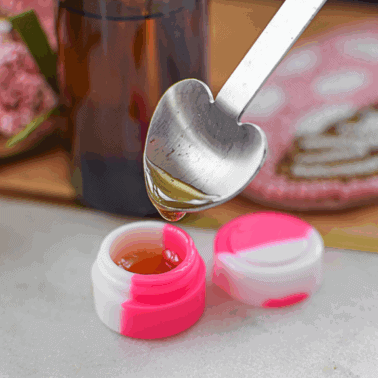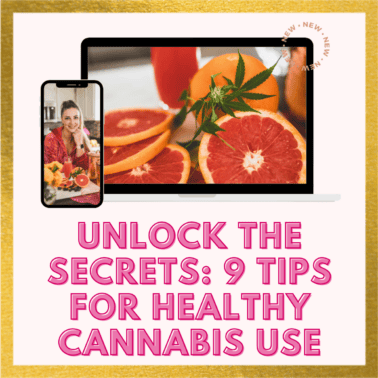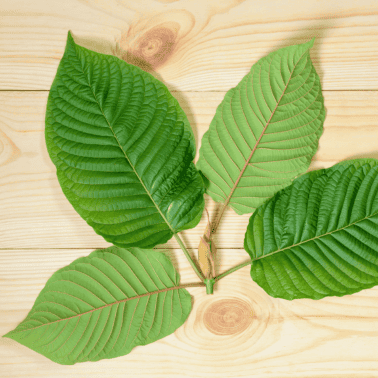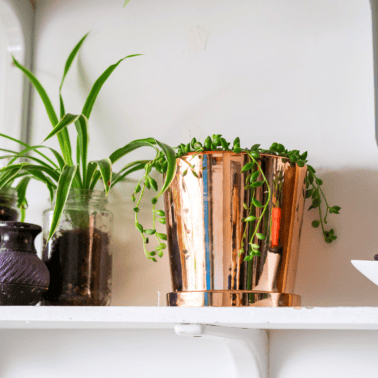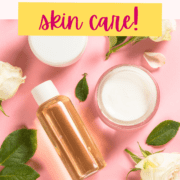Discover these seven amazing rose essential oil, or absolute benefits, and learn more about how this prized plant can be used daily, from your skincare to your hair care routine to supporting your general happiness.
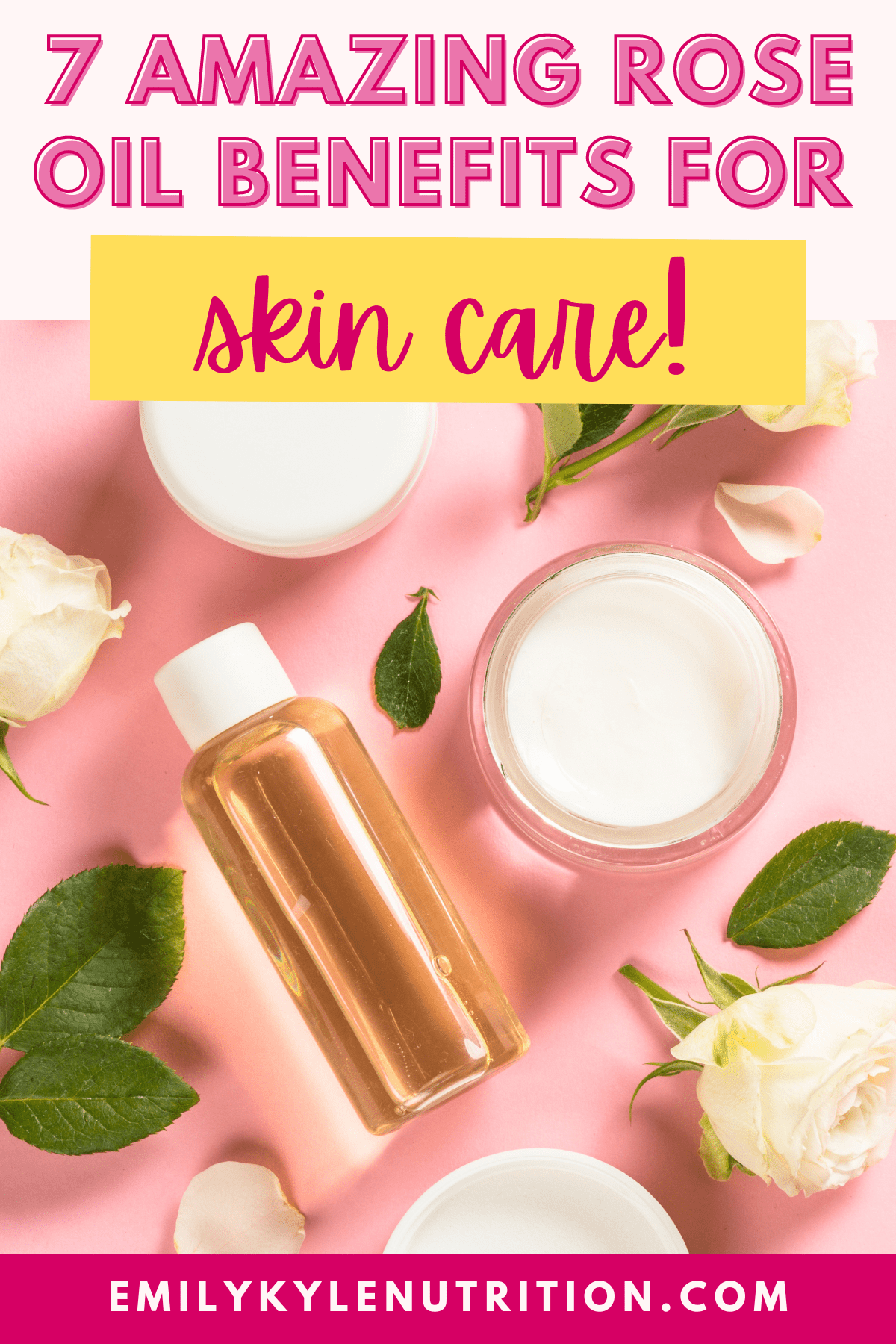
Table of Contents
Features
- An introduction to the benefits of roses
- A list of benefits of rose oil for skin care
- A DIY rose oil recipe to try at home
All About Roses
The rose has been a symbol of romance and femininity for centuries. The regard for these beautiful flowers exists across many cultures, from Europe to the Middle East.
According to legend, ancient Roman goddesses would bathe with rose petals to pamper and nourish their skin.
Historically, roses have been used for various health conditions to treat symptoms of depression, major depressive disorder, sexual dysfunction, menstrual cramps, menstrual pain, heart disease, support for the immune system, and more.
While not proven by the Food and Drug Administration (FDA), numerous benefits are still associated with rose-derived products.
Roses are among the most popular fragrant flowers in modern Western cultures.
They are valued for their fragrance and their beauty.
Rose is similarly valued as one of the most prized essential oils, or absolutes, with many potential therapeutic benefits.
Rose oil has been used for centuries to improve beauty and wellness. It is a great natural remedy for many ailments, such as skin conditions, headaches, stress relief, and more.
In this guide, we will take a closer look at the benefits of roses, discuss essential oils vs. absolutes, and cover how to use roses in your skincare routine.
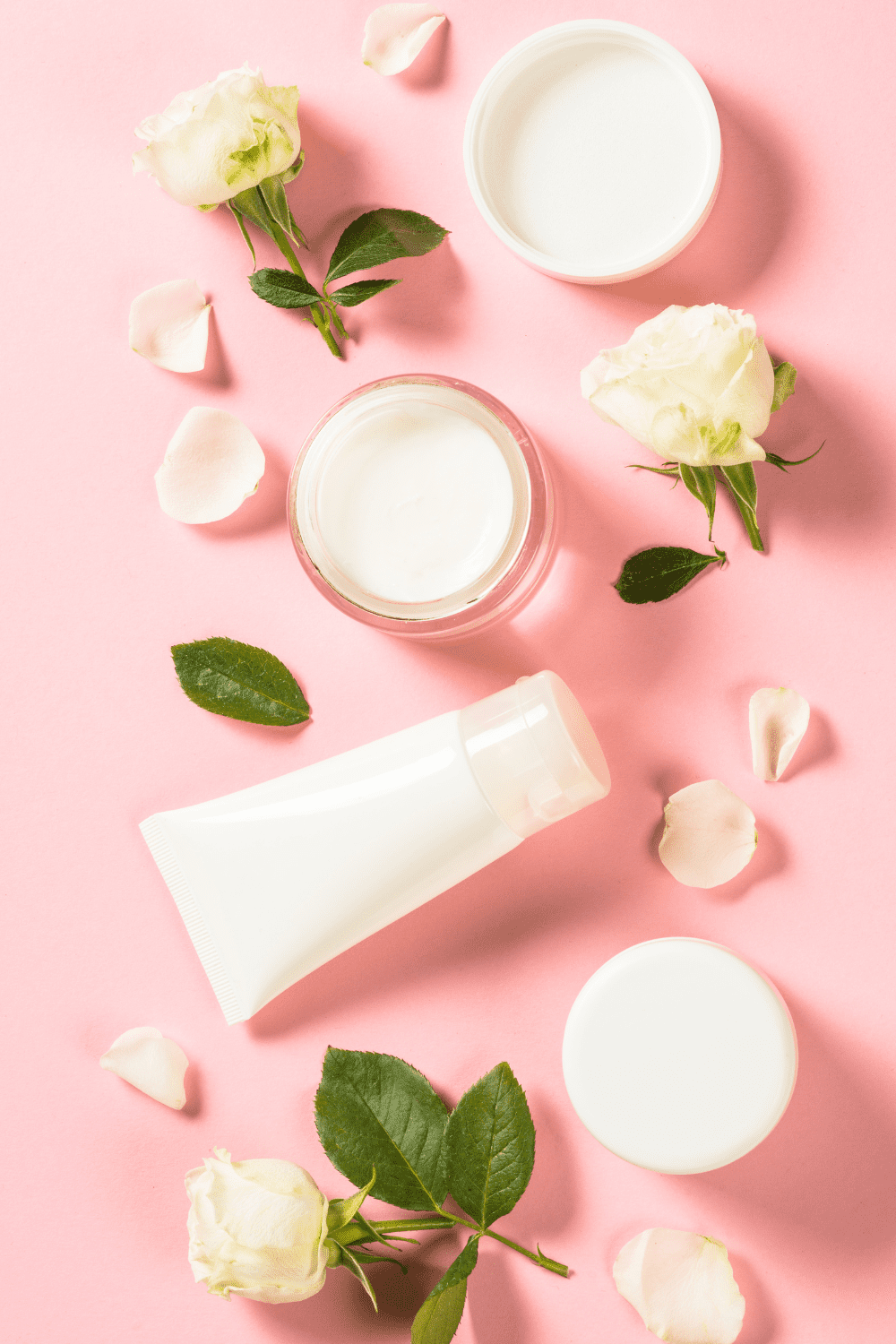
Essential Oils vs. Absolutes
There are several ways to extract the properties we want from plants.
Most commonly, steam distillation is used to create the essential oils we know and love.
Alternatively, you can get an absolute, which is made with the use of chemical solvents like alcohol.
This is similar to making a tincture at home.
When shopping, you may see rose oil labeled as either rose essential oil, rose absolute, or even rose absolute essential oil.
It is said that the absolute extraction method is the best way to capture the essence of the rose.
Facts About Rose Oil
- The botanical name of this plant is Rosa damascena, originating from Bulgaria
- Pure rose oil is quite expensive because it takes many roses and a great deal of labor to create it. Rose can be one of the most expensive essential oils to purchase. According to Pretty Opinionated, it takes 60,000 roses to create a single ounce of oil!
- Know the quality and purity of the oil. With rose oil, which can be quite costly, many brands mix it with other oils and inactive ingredients. Rose oil is often diluted with carrier oils such as coconut oil, olive oil, almond oil, rosehip oil, rosehip seed oil, or grapeseed oil. It’s fine to buy mixtures of essential oils, but you want to know what you’re getting. Read the ingredients.
- Although it is a natural product, rose oil is meant for topical use only and should never be ingested internally.
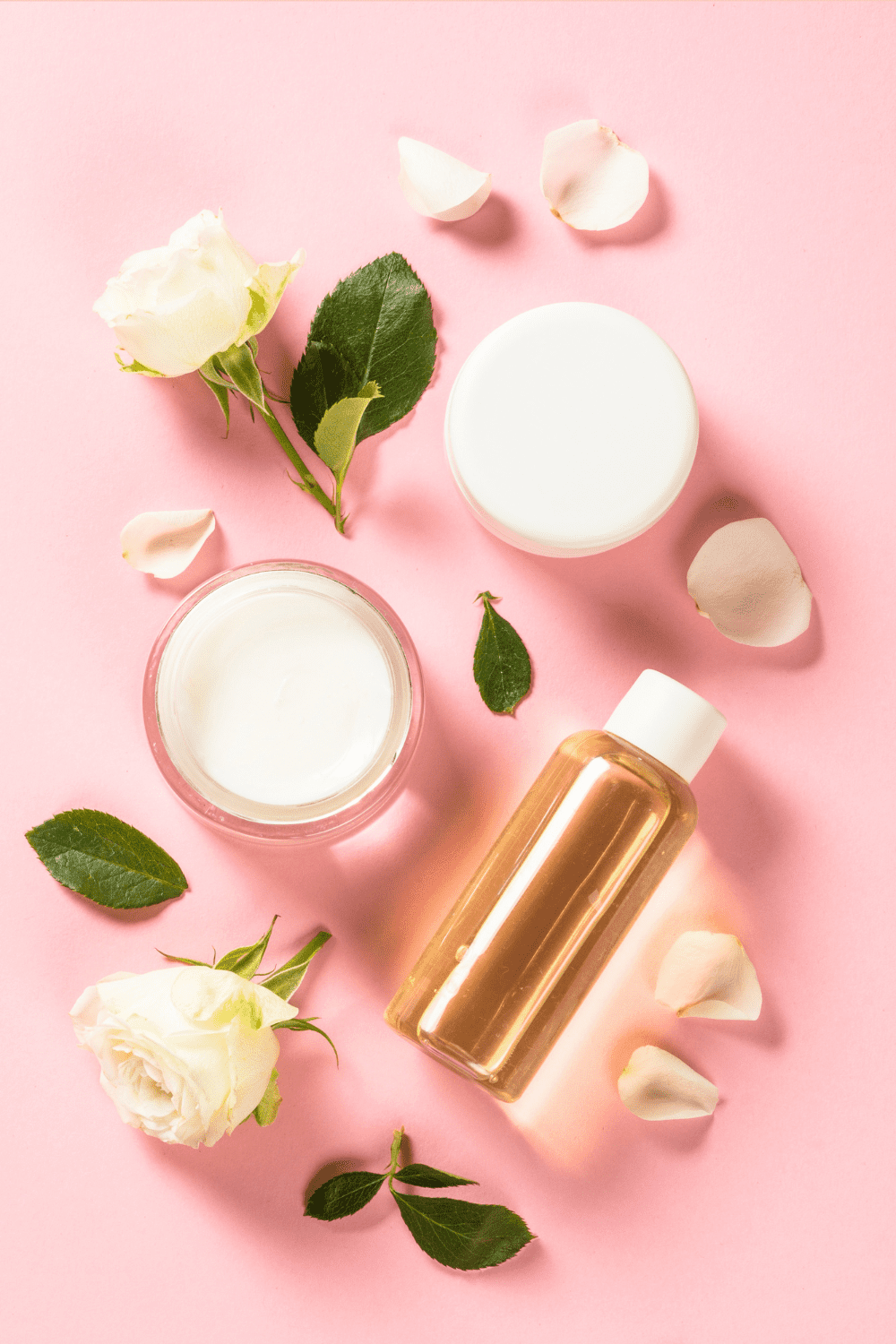
The Leading Benefits of Rose Oil
Rose oil has various physical and emotional benefits and other healing properties.
Calming Effect
One of the main benefits of rose oil is that it can help alleviate stress and anxiety. You can achieve this by using rose oil with a diffuser.
You can also place a couple of drops on body parts such as your wrists and forehead.
Studies have shown that rose oil can slow heart rate, blood pressure, and breathing.
For a refreshing experience, place a few drops of rose oil in a warm bath and soak.
This allows the skin to absorb the oil and provides aromatherapy benefits.
Reduce Stress
Along with providing a calming effect, rose products offer additional anti-stress benefits.
A review of 13 clinical trials found that rose oil can reduce anxiety and promote relaxation. For many, just the scent of rose oil helps alleviate feelings of stress.
Anything that helps reduce your stress levels will also support the health of your skin.
For example, since stress causes inflammation, a bad day at the office can lead to a week of breakouts or dullness.
If you’ve been having a tough time lately, plan a day of pampering with rose-infused skincare.
Of course, self-care is always beneficial, but with the added boost of rose, you’ll be glowing and unbothered in no time.
Promotes Healthy Hair
Using rose oil in the hair may help create healthier, more lustrous hair and ward off hair loss.
In addition, its anti-fungal properties can potentially reduce problems such as dandruff and itchy scalp.
It may even stimulate hair growth. You can look for a shampoo containing rose oil or make your own.
When applying to your hair, mix a few drops of rose oil with carrier oil and apply directly to your hair roots and follicles.
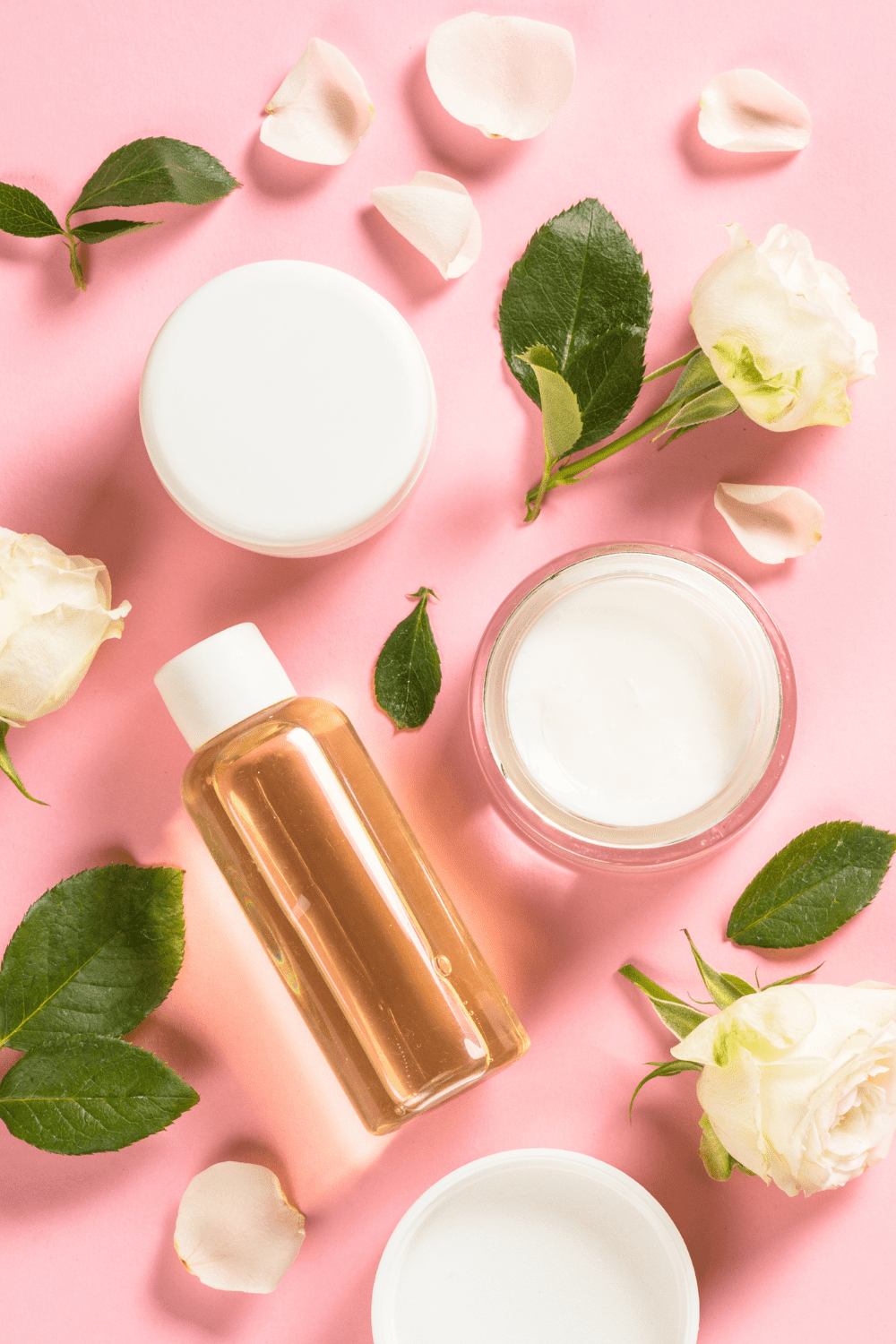
SAVE THIS GUIDE 💌
Benefits of Rose Oil For Skin Care
You may have noticed that many skin care products contain rose oil, such as moisturizing, anti-aging, and sun-blocking lotions.
The use of rose oil, which is rich in antioxidants such as vitamins A and C, has several benefits for the skin.
Here are just a few:
- Provides UV protection from the sun
- Helps to cover scars from injuries, acne, and boils
- It may improve skin tone and help to lighten dark circles from under the eyes
- Offers a soothing effect that protects the skin from diseases such as psoriasis and dermatitis
- Moisturizes the skin, plumps fine lines, and may be beneficial for stretch marks
- Anti-aging effects for mature skin. Rose oil may help reduce wrinkles and give the skin a more youthful appearance
While rose oil is one of the best oils, if you have sensitive skin, run a small patch test first to ensure you don’t experience any negative side effects.
Moisture
Moisture is the key to keeping skin healthy and fresh. Whether you suffer from dry skin or not, you need a consistent moisturizing routine.
Rose petals and skincare products containing rose oil help your skin stay hydrated.
According to a certified nutritionist, “the sugars and natural oils found in rose petals trap moisture in your skin, making your skin look smoother and softer.”
The antioxidants in rose petals also contribute to youthful skin. Antioxidants neutralize free radicals from pollution and stress.
They strengthen skin cells and contribute to healthy tissue regeneration.
Clarity
We all want clear skin, but splotchiness, acne, and other skin issues sometimes feel impossible to overcome.
The struggle is real, but skin clarity is achievable, and rose products can help.
Inflammation is the root cause of most skin problems. However, stress, allergies, and irritating products can all contribute.
Rose has anti-inflammatory and astringent properties that can reduce breakouts by helping balance your skin’s PH levels.
It may also soothe redness and other types of irritation by promoting healthy blood circulation.
The Best Ways to Use Rose Oil
It’s easy to add roses to your skincare routine. A variety of products feature the pleasant aroma of roses.
Just keep your use for cosmetic purposes, as it is not recommended for internal use.
Some ways of testing out rose skincare include:
- Masks
- Lotions
- Serums
- Face washes
- Essence
- Moisturizers
- Toner
If you’re unsure where to begin, try a basic rose water toner.
It’s the perfect way to deep clean your pores after a long day or before doing a face mask.
Other Ways to Enjoy Rose Oil
- Get a diffuser to enjoy rose aromatherapy and spread the scent throughout your home
- Place a few drops in your bath, favorite face, or body wash. You can also add drops of the oil to a hot bath and dip it into sweet-smelling heaven
- Soak your feet in warm water with rose oil and lavender oil
- Place a few drops on areas such as your wrists, forehead, stomach, or the bottom of your feet. Some believe it’s helpful to place oils on acupuncture points such as behind the ears
- Apply it as perfume. Many people use rose oil mainly for its appealing scent. You only need a small amount to get your desired effect
- Use it as a massage oil. Rose, either alone or blended with other oils, is great for a relaxing massage or other types of bodywork. If you’re getting a massage, you can request that the masseuse use rose oil
- Inhale the aroma directly from the bottle. This is the fastest and simplest way to take in the relaxing rose scent without any appliances or preparation needed
Aromatherapy
If you want to reap the benefits of aromatherapy and other uses of essential oils, you should seriously consider including rose oil in your collection.
Despite the high cost, a single drop can be powerful, or you can use it in combination with other oils.
First, make sure you buy a high-quality rose oil and experiment to find out how you can reap the maximum benefits.
Make Your Own Rose Oil
The benefits of DIY rose oil are plentiful. This is a great way to use flowers picked up in your garden for free and turned into something useful.
Just be careful and avoid making your rose oil with roses from the grocery store; they may contain harmful chemicals.
Rose oil can be used in many ways: by itself or mixed with other oils, added to bath water, in a diffuser & more.
Like other oils, DIY rose oil can be used as an ingredient in all recipes: it can be used by itself or mixed with other ingredients to make all kinds of personal care products.
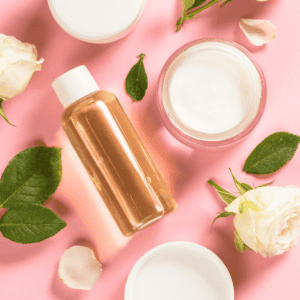
DIY Homemade Rose Oil
Equipment
What You Need
- 2 cups rose petals
- 1 cup coconut oil
- ½ cup olive oil
Instructions
- Put your carrier oil and rose petals in a pint-sized mason jar. Set aside.
- Fill a medium-sized saucepan halfway with water. Put the mason jar in the water. Place on the stove over low heat and allow the water to simmer. Watch for the coconut oil to melt in the jar.
- After the oil has completely melted, turn off the chest. When cool enough to handle, lift the jar from the pan.
- Remove the lid from the mason jar and crush the rose petals with a wooden spoon right in the jar.
- Let the mixture sit for a week.
- Repeat this process one more time (heating the oil) and then strain the roses from the oil.
Notes
Conclusion
Are you interested in adding rose to your natural beauty routine? Have you tried it? Be sure to leave a comment and let us know!
More Holisitic Health Articles
Holistic Health
How to Make Magic Mushroom Concentrate
Free Resources
Unlock the Secrets: 9 Tips for Healthy Cannabis Use 🌸
Holistic Health
Meet Kratom » A Plant You Should Know
Holistic Health

